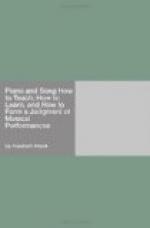MRS. SOLID. But it is said that you have been able to educate only your three daughters, and none others for public performers.
DOMINIE. Madam, you cannot be serious. If I were to declaim Leporello’s list, you might justly consider it an exaggeration; but if, instead of replying to you, I should urge you to read what I have written on the subject, or if I should present your daughter Emily to you, after three or four years, as a superior performer, you might pardon my vanity and my ability. I do not possess any magic wand, which envy and folly could not impute to me as an offence. Nevertheless, unless circumstances were very adverse, I have, at all events, been able in a short time to accomplish for my pupils the acquisition of a good, or at least an improved, musical touch; and have thus laid a foundation, which other teachers have failed to do by their method, or rather want of method. But you have something else on your mind?
MRS. SOLID. You anticipate me. I was educated in Berlin, and in that capital of intelligence a taste prevails for opposition, negation, and thorough criticism. How can you educate artists and virtuosos, when you yourself are so little a virtuoso? You are not even a composer or learned contrapuntist. A teacher of music wins much greater consideration, if he himself plays concertos and composes pretty things, and if he can calculate and give vent to his genius in double and triple fugues, and in inverse and retrograde canons. You cannot even accompany your pupils with the violin or flute, which is certainly very useful and improving.
DOMINIE. The egotist is seldom capable of giving efficient instruction: that lies in the nature of the case. Even a child will soon perceive whether the teacher has a sole eye to its interest, or has other and personal aims in view. The former bears good fruits, the latter very doubtful ones. I will say nothing about the stand-point of those egotistical teachers whose first aim is to bring themselves into prominence, and who at the same time are perhaps travelling public performers and composers. They are, it may be, chiefly occupied with double and triple fugues (the more inverted the more learned), and they consider this knowledge the only correct musical foundation. At the same time, they often possess a touch like that of your brother, Mr. Strict, mentioned in my third chapter, and are utterly devoid of true taste and feeling. While pursuing their fruitless piano lessons, which are quite foreign to their customary train of thought, they regard their occupation only as a milch cow; and they obtain the money of sanguine parents, and sacrifice the time of their pupils. You may try such agreeable personages for yourself: I could wish you no greater punishment.




